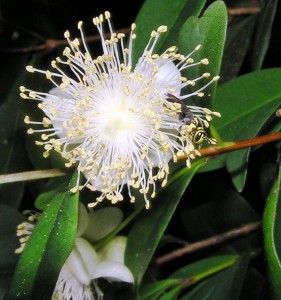PLANT PROFILE
Plum Myrtle
Pilidiostigma glabrum
The Plum Myrtle is named for the rich plum colour of this plants new leaf and stem growth. This colour can be used to great effect in the garden, as in full sun they can display this attractive new growth all year round. But wait there’s more…not only is it one of our most striking local foliage plants, it has beautiful white flowers that are followed by a shiny black fruit that attracts birds. They can grow to a height of between 2-8 metres depending on conditions.
In Reveg’ Plum Myrtle is the perfect edge plant, its dense foliage extending all the way to the ground. This dense foliage helps to create a humid microclimate within a forest and also prevents the penetration of weeds into your developing reveg’. Plum Myrtle produce fruit from approximately 3 years onwards, attracting birds to your reveg site that will inturn deposit local rainforest seed – and not privet, hopefully!
Basically Plum Myrtle’s are one of the great all rounders of our local forests and it may be extreme to say you haven’t fulfilled your potential as a human being if you haven’t planted a Plum Myrtle…but it would be close!
Cheers for now
Spencer Shaw
One of the discussions in circulation at present relates to the movement of endangered fauna and flora to ecosystems that may have similar conditions to what they may require in the future ie. The movement of possums and tree kangaroos from high altitude environments in north queensland, that may warm too much for their survival, to the border ranges between seq and nth nsw. Its only a few years ago we where still deriding the work of the acclimitisation societies of the 1800’s and early 1900’s for their efforts to “improve” and “diversify” ecosystems by moving species around the globe. If human induced climate change causes sufficient change within ecosytems that species will become extinct, then let that remain as a black mark on our record.

